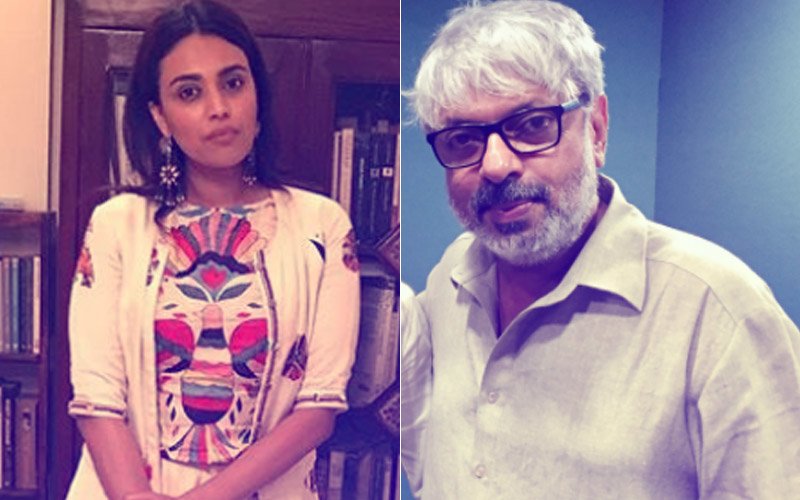“I Felt Like A Vagina”, Swara Bhasker SLAMS Sanjay Leela Bhansali for Glorifying Sati & Jauhar In Padmaavat
In a scathing open letter to Sanjay Leela Bhansali, Swara Bhasker hits out at the filmmaker for glorifying Sati and Jauhar in Padmaavat, says -- “There is more to life than the vagina”

Sanjay Leela Bhansali’s Padmaavat may have got off to an excellent start despite incidents of vandalism in certain parts of the country, but Swara Bhasker finds the glorification of Sati and Jauhar in the magnum opus disappointing.
In an open letter (published on Thewire.in) to Bhansali, the Veere Di Wedding actress raises certain pitfalls Padmaavat seems to be reeling under.
Swara shared the letter on Twitter and wrote, “I loved the performances by all the actors in #Padmaavat - The film is seductive in its grandeur, scale, beauty, power of its actors’s performances, music, design, vision... and therein lies the problem! Some thoughts.. sorry abt the length (sic).”
I loved the performances by all the actors in #Padmaavat - The film is seductive in its grandeur, scale, beauty, power of its actors’s performances, music, design, vision... and therein lies the problem! Some thoughts.. sorry abt the length 🙈🙈🙈https://t.co/0hYnvlAvAD
— Swara Bhasker (@ReallySwara) January 27, 2018
We bring to you excerpts from a rather lengthy note.
She begins scathing this letter by listing down a few basic points about womens’ right to live.
Women have the right to live, despite being raped sir.Women have the right to live, despite the death of their husbands, male ‘protectors’, ‘owners’, ‘controllers of their sexuality’.. whatever you understand the men to be.
Women have the right to live — independent of whether men are living or not.
Women have the right to live. Period.
Women are not only walking talking vaginas.
Yes, women have vaginas, but they have more to them as well. So their whole life need not be focused on the vagina, and controlling it, protecting it, maintaining its purity. (Maybe in the 13th century that was the case, but in the 21st century we do not need to subscribe to these limiting ideas. We certainly do not need to glorify them. )
It would be nice if the vaginas are respected; but in the unfortunate case that they are not, a woman can continue to live. She need not be punished with death, because another person disrespected her vagina without her consent.
There is life outside the vagina, and so there can be life after rape. (I know I repeat, but this point can never be stressed enough.)
In general there is more
to life than the vagina.
She adds, “You may be wondering why the hell I am going on and on thus about vaginas. Because Sir, that’s what I felt like at the end of your magnum opus. I felt like a vagina. I felt reduced to a vagina–only. I felt like all the ‘minor’ achievements that women and women’s movements have made over the years– like the right to vote, the right to own property, the right to education, equal pay for equal work, maternity leave, the Vishakha judgement, the right to adopt children…… all of it was pointless; because we were back to basics.”
“I understand that Jauhar and Sati are a part of our social history. These happened. I understand that they are sensational, shocking dramatic occurrences that lend themselves to splendid, stark and stunning visual representation; especially in the hands of a consummate maker like yourself — but then so were the lynchings of blacks by murderous white mobs in the 19th century in the US – sensational, shocking dramatic social occurrences. Does that mean one should make a film about it with no perspective on racism? Or, without a comment on racial hatred? Worse, should one make a film glorifying lynchings as a sign of some warped notion of hot-bloodedness, purity, bravery – I don’t know, I have no idea how possibly one could glorify such a heinous hate crime,” the letter further states.
“Sir, you will say to me that I am over-reacting and that I must see the film in its context. That it’s a story about people in the 13th Century. And in the 13th century that’s what life was– polygamy was accepted, Muslims were beasts who devoured meat and women alike, and honourable Hindu women happily jumped into their husbands funeral pyre, and if they couldn’t make it to the funeral, they built a pyre and rushed into it — in fact, they liked the idea of collective suicide so much that they gleefully discussed it over their daily beautification rituals... The context of your film is India in the 21st century; where five years ago, a girl was gang-raped brutally in the country’s capital inside a moving bus. She didn’t commit suicide because her honour had been desecrated, Sir. She fought her six rapists. She fought them so hard that one of those monsters shoved an iron rod up her vagina. She was found on the road with her intestines spilling out. Apologies for the graphic details, Sir, but this is the real ‘context’ of your film.”
Swara elaborates,“...Your
cinema particularly is inspiring, evocative and powerful. It can move audiences
to emotional highs and lows. It can influence thinking and that, Sir, is why
you must be responsible as to what it is you are doing and saying in your
film.”
Food for thought.
Image Source: twitter/swarabhaskar,bhansalifc




__2023-10-20-8-8-35_thumbnail_2024-4-18-8-11-19_small.jpg)





